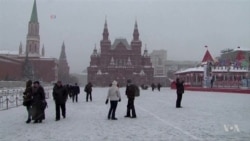Russia is expected to host a second round of international talks on Afghanistan in Moscow on February 15, reports Russia's TASS news agency, with Afghanistan representatives invited for the first time.
Russia says it wants stability and cooperation in the fight against extremists in the region. But Afghan officials are not happy with Russia’s direct talks with the Taliban, which U.S. officials say are aimed at undermining their efforts.
Russian Foreign Minister Sergei Lavrov announced the peace talks on February 7, during a visit by his Afghan counterpart, Salahuddin Rabbani.
China and Pakistan were at December talks in Moscow, while Iran, India and Afghanistan representatives are invited to participate at this week’s round for the first time.
It is not yet clear which representatives have accepted the invitation.
The Russian side will be represented by special presidential envoy for Afghanistan Zamir Kabulov and Deputy Foreign Minister Igor Morgulov, reports TASS.
US not invited
“The essence of these talks is to get together all the countries that have at least some influence in Afghanistan: on the government, or on any informal level, on the armed opposition level, and to work out a certain consensus, so that these countries could implement it in their policies,” says the Center of Contemporary Afghanistan Studies’ Dmitry Verlhoturov.
The United States has not been invited to participate in the talks.
The exclusion of Afghanistan from the first round raised concerns among officials in Kabul as well as in the United States.
“We should not overestimate [the] real ability of [the] Afghan government to control its territory,” says Director of the Analytical Center at the Institute for International Studies at MGIMO University Andrey Kazantsev. “And this was probably one of the reasons why [the] Russian government sometimes acted in cooperation with other players but not with Afghan government.”
Russia wants security cooperation to fight against Islamic State terrorists gaining ground in Central Asia.
“Afghanistan is a place where there are many international terrorists. Many of them are with Russian passports or they are Central Asians, Russian-speaking Central Asians, who can also represent a threat for Russia,” says Kazantsev.
Taliban and Islamic State
While the United Nations says the Taliban is responsible for five times as many deaths and injuries, Islamic State group attacks are growing fast in Afghanistan with a ten-fold growth in 2016.
“There is (Russian) expectation that the Taliban leaders could be talked into opposing the Islamic State and defeating them,” says the Center of Contemporary Afghanistan Studies’ Verlhoturov. “What is it for? So that Afghanistan wouldn't become a shelter for the leaders and militants of the IS who would flee in case of defeat in Syria and Iraq.”
U.S. officials say Russia’s contacts with the Taliban, along with Iran’s and Pakistan’s, lends them legitimacy and support, while undermining the Afghan government and NATO efforts to fight the extremists.
“On one hand it's absurd to say that Russia doesn't strive to stabilize the situation in Afghanistan,” says Verlhoturov. “On the other hand, the Russian leadership is very concerned that the U.S. has acquired several big air bases there that could be used for the deployment of nuclear bombers.”
Russia also looks at the conflict in Afghanistan somewhat cynically, says Kazantsev.
“We know that in some parts of Afghanistan, especially in the east of Afghanistan, there is a real war between Taliban and Islamic State. So, If one terrorist wants to kill another terrorist, why should we prevent this?”
The top U.S. commander in Afghanistan says thousands more U.S. troops are needed there to train Afghanistan’s forces to better handle threats to security.
Ricardo Marquina Montanana contributed to this report.





